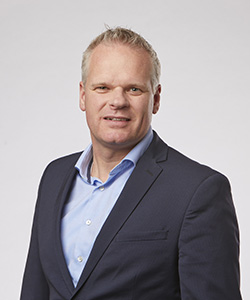In this blog post, Ralph van Aken, Vice President of Sales and Program Management for the Healthcare and Clean Technology Global Business Unit in Europe, and Jonathan (Joey) Evans, UK Country Sales Manager for the Healthcare and Clean Technology Global Business Unit, address the current landscape of clean technology in Europe, along with developments within the United Kingdom specifically.
The State of Clean Technology in Europe
Oct 13, 2020
Overall vision for Clean Technology in Europe
Ralph: DLL has been servicing the clean technology market for more than ten years and we have learned a lot of lessons along the way.
Currently, we are focused around three pillars:
- Working closely with vendor partners to go to market
- Structured transactions, focused on structuring directly for the end-customer
- Retail approach, where we go to market through stores and dealers
Right now, there is a lot of movement in the market. However, we have strong traction across our pillars in energy performance contracts, solar, electric vehicle (EV) charging stations, HVAC (heating, ventilating, and air conditioning) and CHP (combined heat and power). We are seeing small and medium enterprises, as well as consumers, transitioning to solar-powered solutions. There is a strong push from governments to become cleaner (read more about how this impacts the UK, in particular, in our recent whitepaper). In fact, stimulus packages resulting from COVID-19 are including conditions that certain investments must be green investments. In some countries – Spain and Italy, in particular – there is allocated money available to subsidize clean technology investments.

While [clean technology] is a challenging market, there are a lot of opportunities within it. Our team is dedicated to serving the market, and we feel a responsibility to do more."
Vision for Clean Technology in the UK
Joey: In the UK, DLL has been active in clean technology since 2012. Our go-to-market strategy is designed around energy efficiency solutions that would ultimately pay for themselves, rather than focusing on renewable energy, which is reliant upon grants and government subsidies.
In the UK, we are focusing on two pillars, specifically. First, we are focusing on offering structured finance solutions, which present some larger opportunities – like partnering with the National Health Service. Many healthcare systems use large energy centers from which they generate energy, but they are becoming outdated and in need of replacement. Financing can support replacing these with CHP boilers, building controls, LED lighting and much more. These energy efficient solutions can generate significant savings for the hospitals.
Our second focus area is around retail and smaller transactions. This area includes LED lighting, HVAC, ground source heat pumps and battery storage.
Post-pandemic, it is likely that many companies will be more conscious of their energy costs to preserve cash. In the UK, we believe there will be increased demand in the smaller markets as companies will want to ensure they are efficient and sustainable for the future.
Government regulations in the UK
Joey: Right now, there is a lot of emphasis on energy efficiency and reducing carbon emissions in the UK. We were the first of the G20 countries to announce our plans to be carbon neutral by 2050. To meet that promise, there are several government initiatives that have been implemented. One example of those initiatives is the Industrial Energy Transformation Fund, which is a £350M grant fund available to companies to invest in energy efficiency equipment through 2024. This helps to stimulate the market as companies begin investing more in these technologies. Financing can support this as some companies may receive a grant for a portion of these investments, while the rest can be financed to fund the difference.
Another example is the Heat Network Investment Project, which is a stimulus of about £320M provided by the UK government to build heat networks. These networks will serve as a central heating and hot water supply for neighborhoods, rather than houses having individual boilers.
Because of COVID-19, the UK saw a 31 percent drop in net carbon emissions in April and May due to fewer people commuting and traveling. Despite an increase in June as people began returning to work, this is a testament to the fact that we can drastically reduce our carbon emissions.
Assets in high demand
Ralph: We are seeing a strong demand right now for disinfecting and sterilization equipment, such as ultraviolet lights and robots. These projects are well within our scope and certainly an area within clean technology we are interested in strengthening.
Joey: We have funded the first UVC robot in the UK to outfit and sterilize ambulances in response to the increased need for disinfecting measures related to COVID-19.
In addition, we have funded several energy centers for hospitals, most recently for St. James University Hospitals in Leeds. This project will generate substantial savings for the hospital – enough so that the hospital essentially will not have to pay for the equipment itself, as the cost is covered by the savings generated.

Energy efficiency doesn’t have to cost the earth."
Lastly, there’s still a great demand for LED lighting, as well as opportunities for battery storage related to solar, heat pumps, variable speed drives, and electric vehicle charging points. Resulting from shifting demand related to the pandemic, we recently closed a deal together with Rabobank for a company called GreenMo to provide electric scooters for takeout orders from a number of restaurants in central London.
DLL’s unique advantage
Ralph: One of DLL’s competitive advantages is that we were one of the first companies to provide finance solutions within the clean technology market and have built deep market knowledge over the years. We also service the full spectrum of opportunities – from structured transactions, to a vendor model to working directly with the end-customer. In partnership with Rabobank, we have the capabilities to service all levels of the entire energy and sustainability sector.
Joey: We are also diligent about staying on top of new developments within the market and working closely with business leaders. The recent white paper we published includes a forward from the Confederation of British Industry (CBI), and as a result of our collaboration on the whitepaper, DLL was invited to join the Energy and Climate Change Committee within the CBI. We were also a finalist for the UK Green Business Leaders award and are nominated to participate in the Reuters Responsible Business Awards 2020 and Leasing Life Awards.
What’s next?
Ralph: As a global business unit, our goal is to grow 25 percent year-over-year within Clean Technology. While it is a challenging market, there are a lot of opportunities within it. Our team is dedicated to serving the market, and we feel a responsibility to do more.
Joey: In the UK, we are pursuing more large-structure deals to expand our portfolio. As the accounting standards are changing, we must become more comfortable with performance-based energy service agreements that guarantee an energy output. Since we are smaller and more nimble than traditional banks, we are able to adapt to these sorts of contracts more quickly, which can significantly open market opportunities.
There is also a government initiative called the Energy Saving Opportunity Scheme (ESOS), which is a European directive where companies of a certain size must perform an energy audit. If potential energy-savings measures are identified, these companies are then encouraged to invest in them. If ESOS eventually mandates these measures, it would drive huge reductions in carbon emissions and DLL can support companies in updating their infrastructure.
The pandemic has proven the potential to dramatically reduce carbon emissions, and at DLL, we are passionate about supporting a more sustainable world. Energy efficiency doesn’t have to cost the earth.
